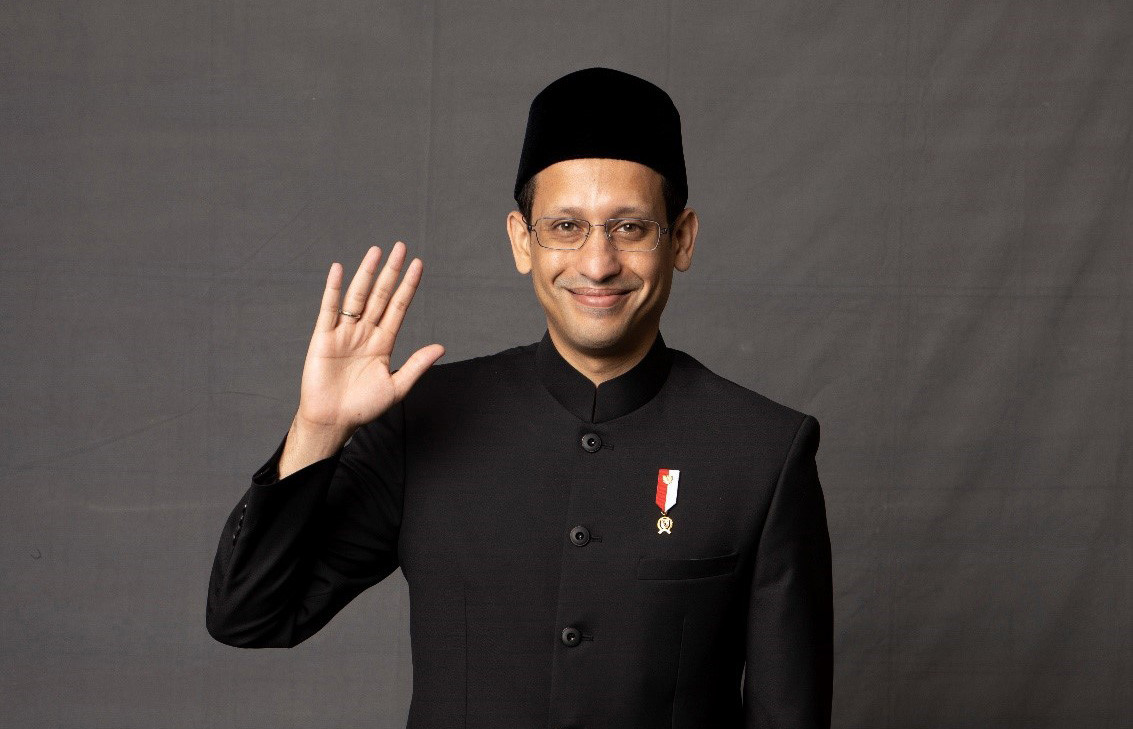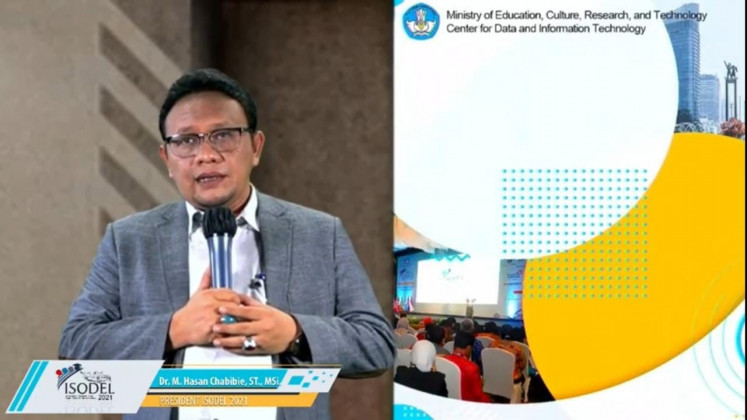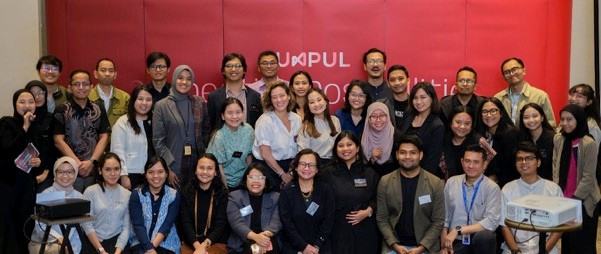Education ministry holds virtual symposium for open, distance and e-learning
Change text size
Gift Premium Articles
to Anyone
 Nadiem Anwar Makarim, Ministry Education, Cultural, Research and Technology.
Nadiem Anwar Makarim, Ministry Education, Cultural, Research and Technology.
T
he Education, Culture, Research and Technology Ministry held the 2021 International Open, Distance and e-Learning Symposium (ISODEL) from Dec. 1 to 3. The theme of this year’s symposium was “Education technology in the new normal: Now and beyond”.
As the title states, ISODEL’s 2021 focus was highlighting technological innovations to support schools across the country engaging in remote education during Covid-19.
Opening the symposium was Suharti, Secretary General of the Education, Culture, Research and Technology Ministry. She spoke about the crisis that schools faced due to closures.
“Right now, we must admit that school closures have taken children out of their usual learning environment. Studies show that school closures cause learning loss,” Suharti explained. “Being part of the recovery, the Indonesian government puts tremendous effort into safety, bringing back students to school.”
Apart from increasing vaccination rates among teachers and students and encouraging local governments to intensify testing, tracing and treatment, Suharti also mentioned that the ministry was doing its part to support remote learning.
“For areas at high risk, we support locally designed distance learning innovations,” she said. “Through ISODEL, we will listen and pay attention to practical innovations that will improve learning access and quality. We look forward to learning more about your initiatives.”
Education, Culture, Research and Technology Minister Nadiem Makarin also made opening remarks.
“Nowadays, we’ve been using the term ‘disruption of technology’ to describe the transformation of systems due to rapid technological changes and innovations,” Nadiem began. “The world of education, too, is affected by this disruption, and we have no choice but to adapt and innovate and turn that disruption into a solution. That is what we’re seeking to achieve through the digitalization of schools.”
“Ideas born during this 2021 ISODEL will be precious input for us to continue that initiative,” Nadiem said at the end of his speech. “Therefore, I hope this symposium will give rise to brilliant ideas that will support and accelerate the digitalization of education in Indonesia.”
The virtual symposium proceeded with keynote speeches from numerous experts and representatives. One of them was Tantowi Yahya, the Indonesian ambassador to New Zealand.
Tantowi deemed the symposium a “timely” event, considering how education in Indonesia and the world as a whole had suffered from the pandemic. He expressed his belief that communication technology would help preserve culture because of its sustainability, expansive archiving and role in broadening cultural exposure.
The event continued with a series of plenary sessions. The first one was “Industry 4.0: Big Data, Internet of Things (IoT), Artificial Intellegence (AI), Financial Technology (Fintech), Virtual and Augmented Reality (VR and AR), Games, Virtual Classroom and Campus, Statistics, Webinars”, followed by “Digital Educational Transformation: Closing the digital gap to Reach the Unreached, Remote Areas, Open Access, Flexible Learning, Disability Access”.
The day ended with Finance Minister Sri Mulyani Indrawati disclosing the funds allocated for teaching, research and cultural activities. She accentuated the importance of aiding economically vulnerable communities and providing scholarships for every Indonesian aiming to pursue higher education.
The virtual symposium continued on Dec. 2, with the theme of “Character Building: Digital literacy, 21st century skills (critical thinking and problem solving, collaboration, communication, creativity and innovation), life skills, learning to be, learning to do, learning to learn, learning to live together”.
The first speech was from Han Xiao Zang, an education counselor to the Australian Embassy. In his presentation, Zang presented his reflections on education-related ventures between Indonesia and Australia, especially regarding diversification plans by the Australian Education Minister.
Participants in ISODEL then joined plenary rooms for various presentations on character building among students. The topics were diverse, ranging from the use of edX as a platform to study the cultures of Asian countries to empowering students with dyslexia amid the Covid-19 pandemic.
As part of the Indonesian Distance Learning Network (IDLN), the Home Ministry sent Director of Demographics and Civil Records Zudan Arif Fakrulloh. He talked about the importance of ethics in a distance learning environment.
Dale Johnson, the Director of Digital Innovation from the University Design Institute at Arizona State University, meanwhile, asked teachers to take into account their students’ different backgrounds to create an immersive and engaging learning experience.
After a lunch break, participants were free to explore two plenary rooms with Epson Indonesia and SEAMO VOCTECH in collaboration with Denise Whitelock of Open University in the United Kingdom.
The day approached its end with closing remarks from Communications and Information Minister Johnny G. Plate. He noted how the digitalization of education in the midst of the COVID-19 pandemic had advanced, as demonstrated by the success of the ministry’s Learning Management System (LMS).
The second day concluded with a session with Libing Wang, Chief of Section for Educational Innovations and Skills Development (EISD) in Bangkok
The third day’s theme was “Utilization of ICT to Expand Cultural Values and Character Building.” In the first main session, Lim Cher Ping of the Education University of Hong Kong presented several frameworks of competencies to help teachers formulate blended learning content.
Plenary sessions continued with the theme “Preserving Future Children’s Characters and Culture by ICT”. Experts at both sessions agreed to maintain cultural values within the curriculum to help build students’ characters. This included integrating cultural norms within the remote learning system supported by Information and Communication Technologies (ICT).
Before lunch break, Ojat Darojat, Chancellor of Universitas Terbuka (Open University) demonstrated the success of Universitas Terbuka in cementing its longstanding reputation as a higher educational institution that used remote learning to its fullest potential.
The remaining events were presentations in parallel rooms. Educators from all over Indonesia and from various institutions shared their research papers and interacted with listeners to gain feedback and recommendations.
Their topics were very relevant to the needs of students facing learning loss and needing alternatives to conventional teaching. They included a wide range of subjects, from gamification in English vocabulary learning to educational television.

The 2021 event finally came to a close with a speech from M. Hasan Chabibie, Head of the Center for Data and Information at the Education, Culture, Research and Technology Ministry.
Hasan observed that the interaction between experts, researchers and participants had created a new interest in technological and industrial innovations, especially for the education sector.
“The 2021 ISODEL has proven that through collaboration, we can easily complement each other and produce new creations optimally.” Hasan commented.
“Character building, which has been under the spotlight since the start of nationwide digital learning, must also be addressed wisely.” Hasan added. “When teachers and parents alike start to question distance learning’s abilities to build the students characters, we must not forget that ICT too can open doors to teach positive cultural values.”
Finally, Hasan thanked the event committee, from IDLN members to sponsors. He also expressed his gratitude to speakers, researchers and moderators participating in the symposium.
Apart from talks on the main stage and plenary rooms, there were also booths that participants could visit in the virtual exhibition hall. Tenants included the education ministry’s Rumah Belajar Indonesia and Emliku, a Taiwanese company that provided Universitas Trisakti with a hybrid classroom. Participants could also listen to podcasts hosted by education experts from Indonesia and abroad.









